Business Issues In GCC And EU
VerifiedAdded on 2022/08/14
|6
|1846
|25
AI Summary
Contribute Materials
Your contribution can guide someone’s learning journey. Share your
documents today.
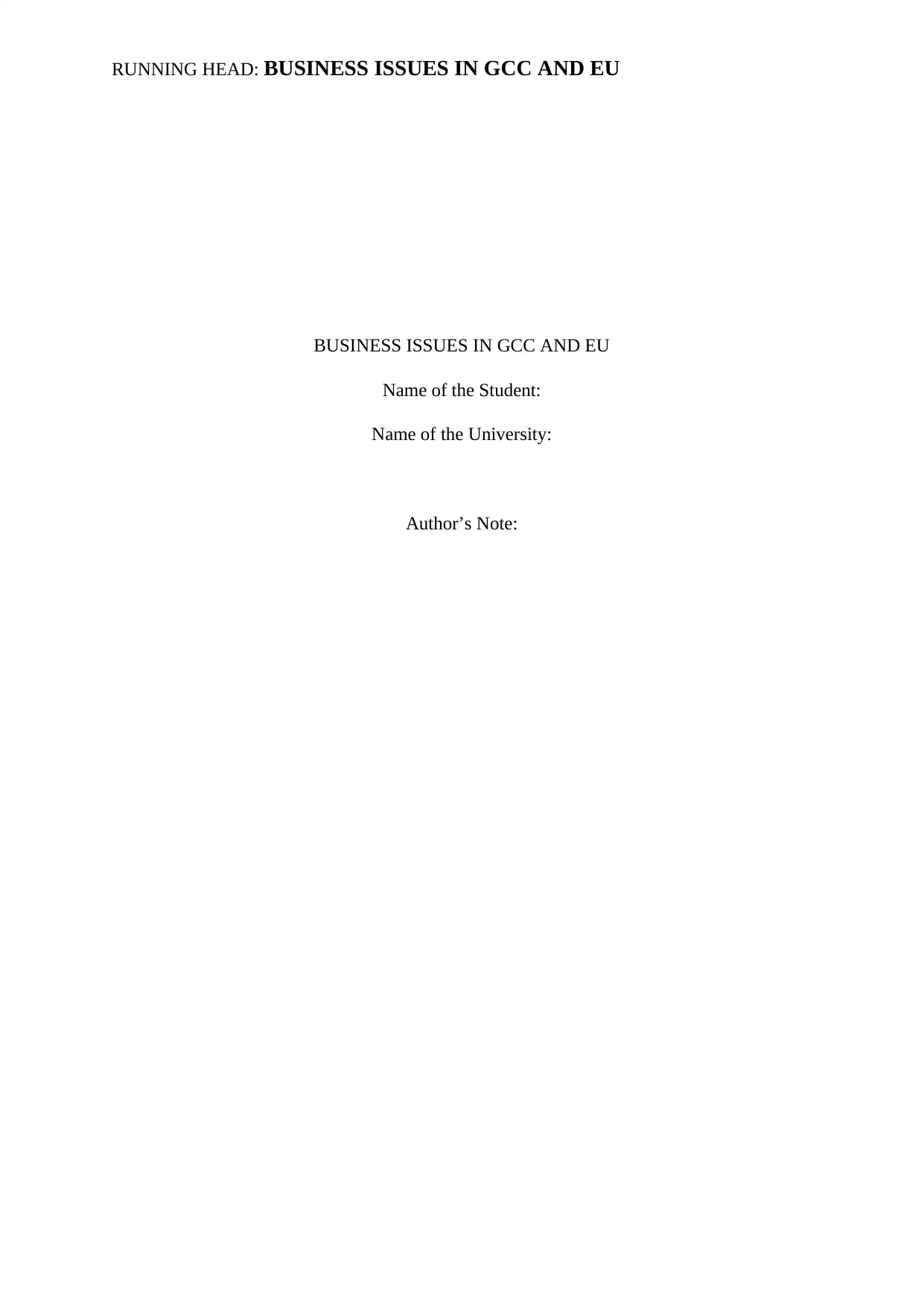
RUNNING HEAD: BUSINESS ISSUES IN GCC AND EU
BUSINESS ISSUES IN GCC AND EU
Name of the Student:
Name of the University:
Author’s Note:
BUSINESS ISSUES IN GCC AND EU
Name of the Student:
Name of the University:
Author’s Note:
Secure Best Marks with AI Grader
Need help grading? Try our AI Grader for instant feedback on your assignments.
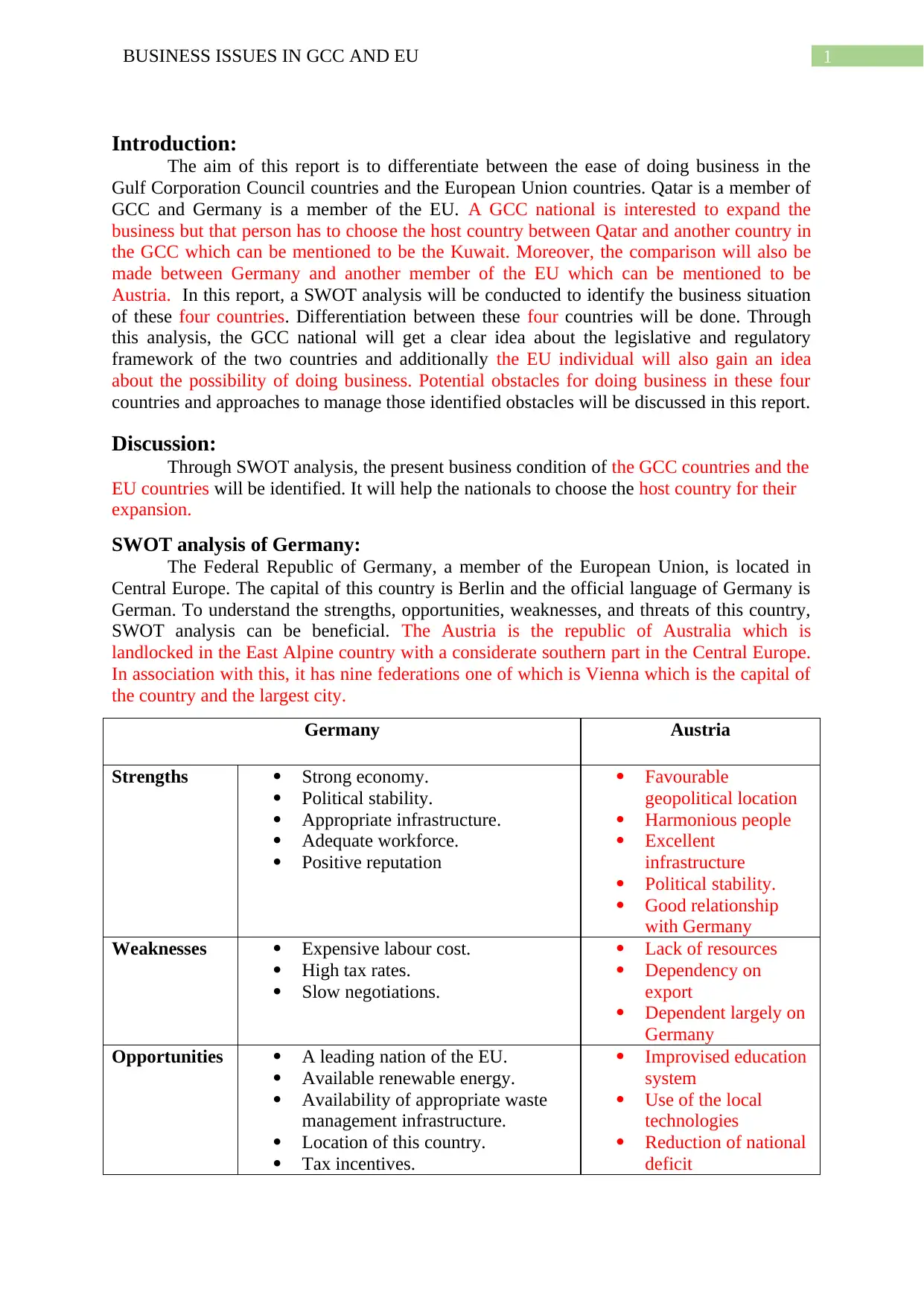
1BUSINESS ISSUES IN GCC AND EU
Introduction:
The aim of this report is to differentiate between the ease of doing business in the
Gulf Corporation Council countries and the European Union countries. Qatar is a member of
GCC and Germany is a member of the EU. A GCC national is interested to expand the
business but that person has to choose the host country between Qatar and another country in
the GCC which can be mentioned to be the Kuwait. Moreover, the comparison will also be
made between Germany and another member of the EU which can be mentioned to be
Austria. In this report, a SWOT analysis will be conducted to identify the business situation
of these four countries. Differentiation between these four countries will be done. Through
this analysis, the GCC national will get a clear idea about the legislative and regulatory
framework of the two countries and additionally the EU individual will also gain an idea
about the possibility of doing business. Potential obstacles for doing business in these four
countries and approaches to manage those identified obstacles will be discussed in this report.
Discussion:
Through SWOT analysis, the present business condition of the GCC countries and the
EU countries will be identified. It will help the nationals to choose the host country for their
expansion.
SWOT analysis of Germany:
The Federal Republic of Germany, a member of the European Union, is located in
Central Europe. The capital of this country is Berlin and the official language of Germany is
German. To understand the strengths, opportunities, weaknesses, and threats of this country,
SWOT analysis can be beneficial. The Austria is the republic of Australia which is
landlocked in the East Alpine country with a considerate southern part in the Central Europe.
In association with this, it has nine federations one of which is Vienna which is the capital of
the country and the largest city.
Germany Austria
Strengths Strong economy.
Political stability.
Appropriate infrastructure.
Adequate workforce.
Positive reputation
Favourable
geopolitical location
Harmonious people
Excellent
infrastructure
Political stability.
Good relationship
with Germany
Weaknesses Expensive labour cost.
High tax rates.
Slow negotiations.
Lack of resources
Dependency on
export
Dependent largely on
Germany
Opportunities A leading nation of the EU.
Available renewable energy.
Availability of appropriate waste
management infrastructure.
Location of this country.
Tax incentives.
Improvised education
system
Use of the local
technologies
Reduction of national
deficit
Introduction:
The aim of this report is to differentiate between the ease of doing business in the
Gulf Corporation Council countries and the European Union countries. Qatar is a member of
GCC and Germany is a member of the EU. A GCC national is interested to expand the
business but that person has to choose the host country between Qatar and another country in
the GCC which can be mentioned to be the Kuwait. Moreover, the comparison will also be
made between Germany and another member of the EU which can be mentioned to be
Austria. In this report, a SWOT analysis will be conducted to identify the business situation
of these four countries. Differentiation between these four countries will be done. Through
this analysis, the GCC national will get a clear idea about the legislative and regulatory
framework of the two countries and additionally the EU individual will also gain an idea
about the possibility of doing business. Potential obstacles for doing business in these four
countries and approaches to manage those identified obstacles will be discussed in this report.
Discussion:
Through SWOT analysis, the present business condition of the GCC countries and the
EU countries will be identified. It will help the nationals to choose the host country for their
expansion.
SWOT analysis of Germany:
The Federal Republic of Germany, a member of the European Union, is located in
Central Europe. The capital of this country is Berlin and the official language of Germany is
German. To understand the strengths, opportunities, weaknesses, and threats of this country,
SWOT analysis can be beneficial. The Austria is the republic of Australia which is
landlocked in the East Alpine country with a considerate southern part in the Central Europe.
In association with this, it has nine federations one of which is Vienna which is the capital of
the country and the largest city.
Germany Austria
Strengths Strong economy.
Political stability.
Appropriate infrastructure.
Adequate workforce.
Positive reputation
Favourable
geopolitical location
Harmonious people
Excellent
infrastructure
Political stability.
Good relationship
with Germany
Weaknesses Expensive labour cost.
High tax rates.
Slow negotiations.
Lack of resources
Dependency on
export
Dependent largely on
Germany
Opportunities A leading nation of the EU.
Available renewable energy.
Availability of appropriate waste
management infrastructure.
Location of this country.
Tax incentives.
Improvised education
system
Use of the local
technologies
Reduction of national
deficit
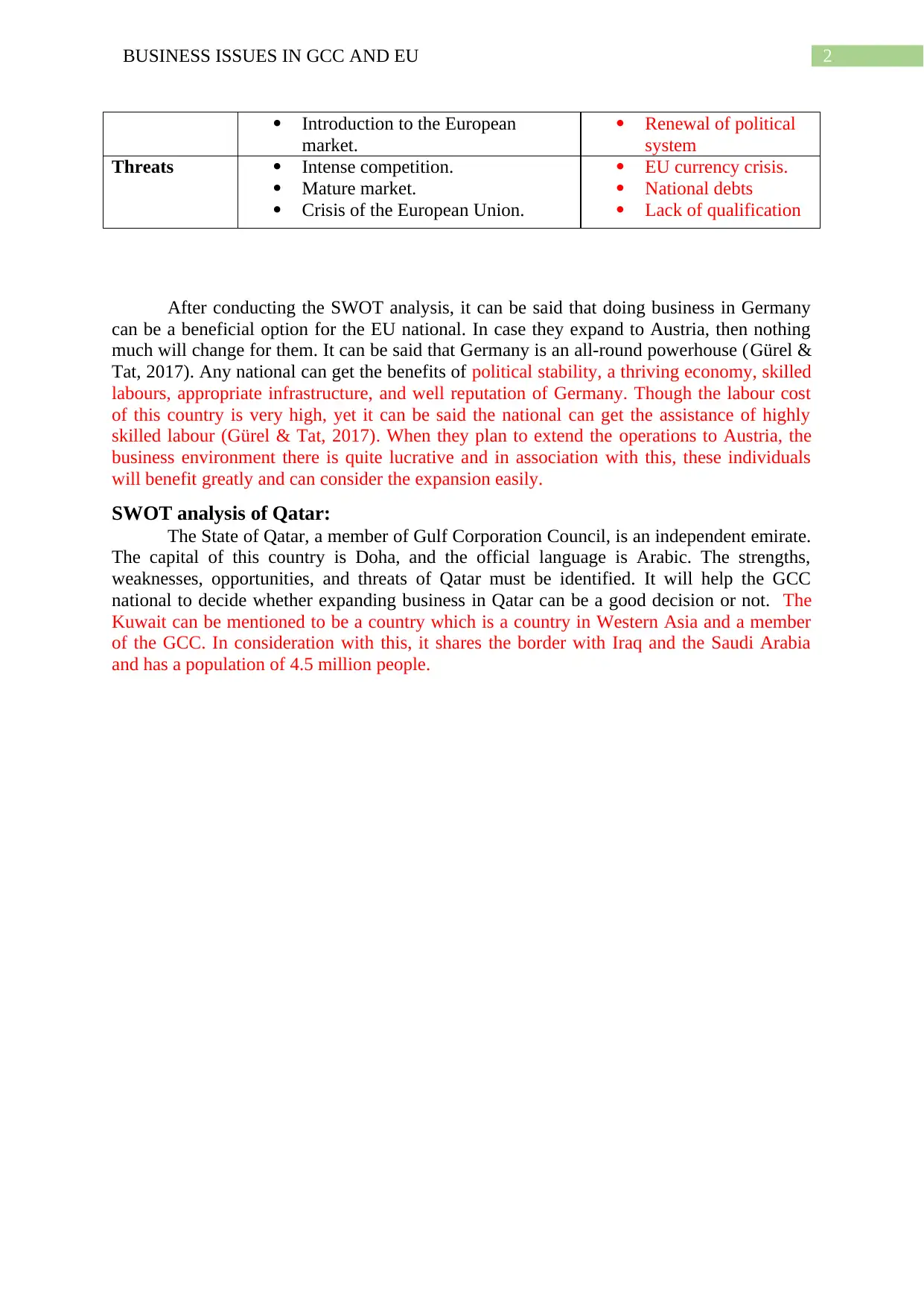
2BUSINESS ISSUES IN GCC AND EU
Introduction to the European
market.
Renewal of political
system
Threats Intense competition.
Mature market.
Crisis of the European Union.
EU currency crisis.
National debts
Lack of qualification
After conducting the SWOT analysis, it can be said that doing business in Germany
can be a beneficial option for the EU national. In case they expand to Austria, then nothing
much will change for them. It can be said that Germany is an all-round powerhouse (Gürel &
Tat, 2017). Any national can get the benefits of political stability, a thriving economy, skilled
labours, appropriate infrastructure, and well reputation of Germany. Though the labour cost
of this country is very high, yet it can be said the national can get the assistance of highly
skilled labour (Gürel & Tat, 2017). When they plan to extend the operations to Austria, the
business environment there is quite lucrative and in association with this, these individuals
will benefit greatly and can consider the expansion easily.
SWOT analysis of Qatar:
The State of Qatar, a member of Gulf Corporation Council, is an independent emirate.
The capital of this country is Doha, and the official language is Arabic. The strengths,
weaknesses, opportunities, and threats of Qatar must be identified. It will help the GCC
national to decide whether expanding business in Qatar can be a good decision or not. The
Kuwait can be mentioned to be a country which is a country in Western Asia and a member
of the GCC. In consideration with this, it shares the border with Iraq and the Saudi Arabia
and has a population of 4.5 million people.
Introduction to the European
market.
Renewal of political
system
Threats Intense competition.
Mature market.
Crisis of the European Union.
EU currency crisis.
National debts
Lack of qualification
After conducting the SWOT analysis, it can be said that doing business in Germany
can be a beneficial option for the EU national. In case they expand to Austria, then nothing
much will change for them. It can be said that Germany is an all-round powerhouse (Gürel &
Tat, 2017). Any national can get the benefits of political stability, a thriving economy, skilled
labours, appropriate infrastructure, and well reputation of Germany. Though the labour cost
of this country is very high, yet it can be said the national can get the assistance of highly
skilled labour (Gürel & Tat, 2017). When they plan to extend the operations to Austria, the
business environment there is quite lucrative and in association with this, these individuals
will benefit greatly and can consider the expansion easily.
SWOT analysis of Qatar:
The State of Qatar, a member of Gulf Corporation Council, is an independent emirate.
The capital of this country is Doha, and the official language is Arabic. The strengths,
weaknesses, opportunities, and threats of Qatar must be identified. It will help the GCC
national to decide whether expanding business in Qatar can be a good decision or not. The
Kuwait can be mentioned to be a country which is a country in Western Asia and a member
of the GCC. In consideration with this, it shares the border with Iraq and the Saudi Arabia
and has a population of 4.5 million people.
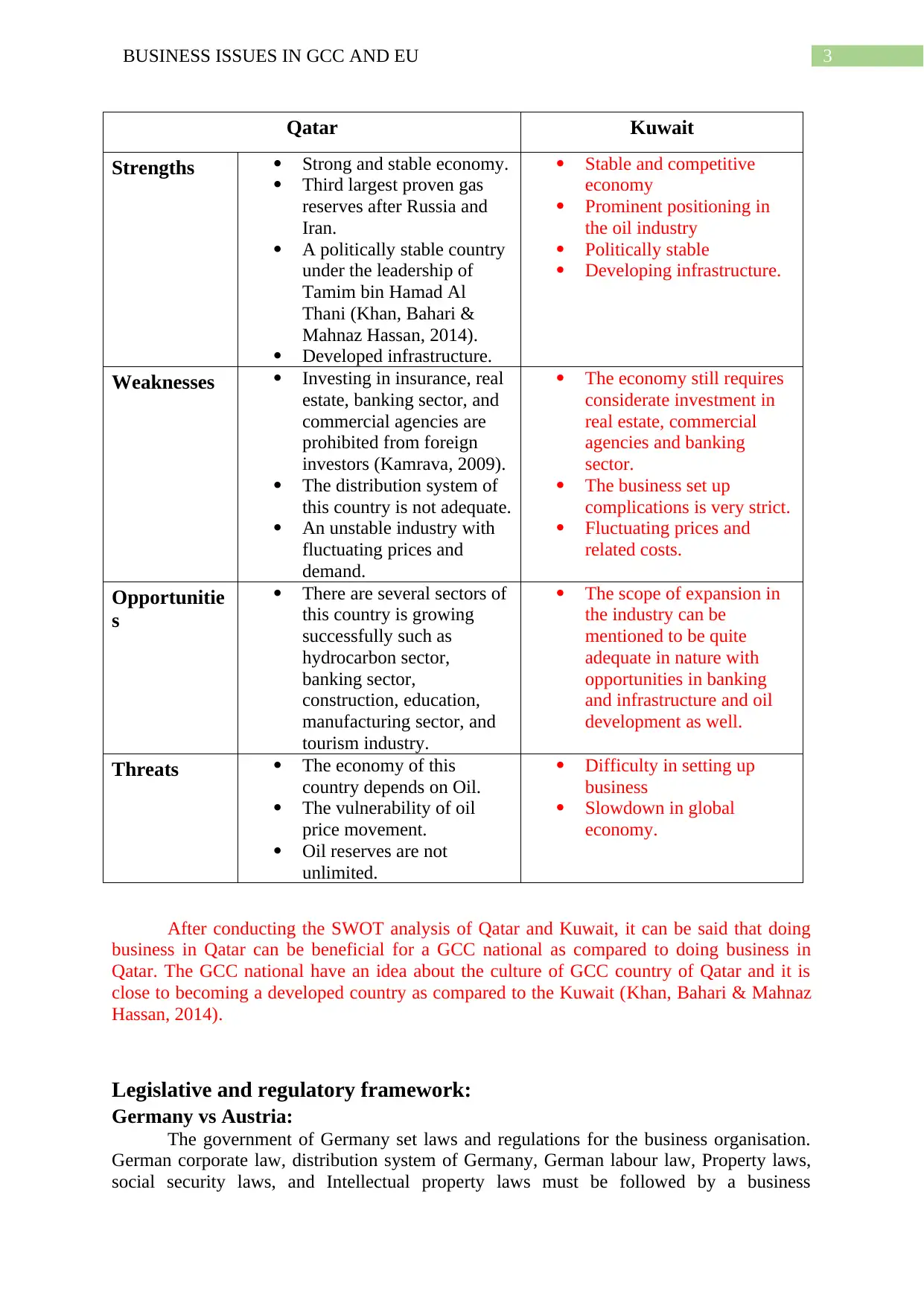
3BUSINESS ISSUES IN GCC AND EU
Qatar Kuwait
Strengths Strong and stable economy.
Third largest proven gas
reserves after Russia and
Iran.
A politically stable country
under the leadership of
Tamim bin Hamad Al
Thani (Khan, Bahari &
Mahnaz Hassan, 2014).
Developed infrastructure.
Stable and competitive
economy
Prominent positioning in
the oil industry
Politically stable
Developing infrastructure.
Weaknesses Investing in insurance, real
estate, banking sector, and
commercial agencies are
prohibited from foreign
investors (Kamrava, 2009).
The distribution system of
this country is not adequate.
An unstable industry with
fluctuating prices and
demand.
The economy still requires
considerate investment in
real estate, commercial
agencies and banking
sector.
The business set up
complications is very strict.
Fluctuating prices and
related costs.
Opportunitie
s
There are several sectors of
this country is growing
successfully such as
hydrocarbon sector,
banking sector,
construction, education,
manufacturing sector, and
tourism industry.
The scope of expansion in
the industry can be
mentioned to be quite
adequate in nature with
opportunities in banking
and infrastructure and oil
development as well.
Threats The economy of this
country depends on Oil.
The vulnerability of oil
price movement.
Oil reserves are not
unlimited.
Difficulty in setting up
business
Slowdown in global
economy.
After conducting the SWOT analysis of Qatar and Kuwait, it can be said that doing
business in Qatar can be beneficial for a GCC national as compared to doing business in
Qatar. The GCC national have an idea about the culture of GCC country of Qatar and it is
close to becoming a developed country as compared to the Kuwait (Khan, Bahari & Mahnaz
Hassan, 2014).
Legislative and regulatory framework:
Germany vs Austria:
The government of Germany set laws and regulations for the business organisation.
German corporate law, distribution system of Germany, German labour law, Property laws,
social security laws, and Intellectual property laws must be followed by a business
Qatar Kuwait
Strengths Strong and stable economy.
Third largest proven gas
reserves after Russia and
Iran.
A politically stable country
under the leadership of
Tamim bin Hamad Al
Thani (Khan, Bahari &
Mahnaz Hassan, 2014).
Developed infrastructure.
Stable and competitive
economy
Prominent positioning in
the oil industry
Politically stable
Developing infrastructure.
Weaknesses Investing in insurance, real
estate, banking sector, and
commercial agencies are
prohibited from foreign
investors (Kamrava, 2009).
The distribution system of
this country is not adequate.
An unstable industry with
fluctuating prices and
demand.
The economy still requires
considerate investment in
real estate, commercial
agencies and banking
sector.
The business set up
complications is very strict.
Fluctuating prices and
related costs.
Opportunitie
s
There are several sectors of
this country is growing
successfully such as
hydrocarbon sector,
banking sector,
construction, education,
manufacturing sector, and
tourism industry.
The scope of expansion in
the industry can be
mentioned to be quite
adequate in nature with
opportunities in banking
and infrastructure and oil
development as well.
Threats The economy of this
country depends on Oil.
The vulnerability of oil
price movement.
Oil reserves are not
unlimited.
Difficulty in setting up
business
Slowdown in global
economy.
After conducting the SWOT analysis of Qatar and Kuwait, it can be said that doing
business in Qatar can be beneficial for a GCC national as compared to doing business in
Qatar. The GCC national have an idea about the culture of GCC country of Qatar and it is
close to becoming a developed country as compared to the Kuwait (Khan, Bahari & Mahnaz
Hassan, 2014).
Legislative and regulatory framework:
Germany vs Austria:
The government of Germany set laws and regulations for the business organisation.
German corporate law, distribution system of Germany, German labour law, Property laws,
social security laws, and Intellectual property laws must be followed by a business
Secure Best Marks with AI Grader
Need help grading? Try our AI Grader for instant feedback on your assignments.
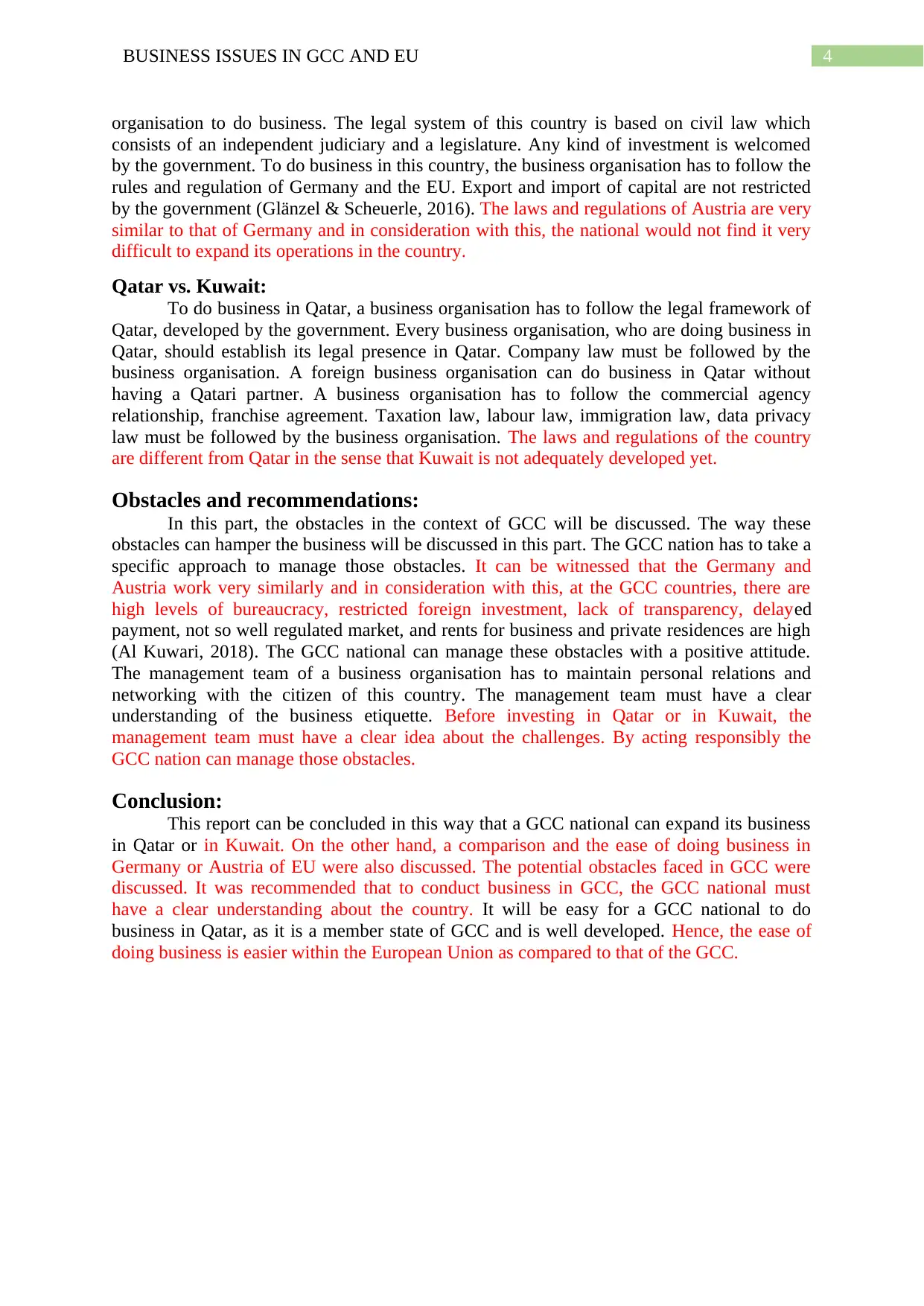
4BUSINESS ISSUES IN GCC AND EU
organisation to do business. The legal system of this country is based on civil law which
consists of an independent judiciary and a legislature. Any kind of investment is welcomed
by the government. To do business in this country, the business organisation has to follow the
rules and regulation of Germany and the EU. Export and import of capital are not restricted
by the government (Glänzel & Scheuerle, 2016). The laws and regulations of Austria are very
similar to that of Germany and in consideration with this, the national would not find it very
difficult to expand its operations in the country.
Qatar vs. Kuwait:
To do business in Qatar, a business organisation has to follow the legal framework of
Qatar, developed by the government. Every business organisation, who are doing business in
Qatar, should establish its legal presence in Qatar. Company law must be followed by the
business organisation. A foreign business organisation can do business in Qatar without
having a Qatari partner. A business organisation has to follow the commercial agency
relationship, franchise agreement. Taxation law, labour law, immigration law, data privacy
law must be followed by the business organisation. The laws and regulations of the country
are different from Qatar in the sense that Kuwait is not adequately developed yet.
Obstacles and recommendations:
In this part, the obstacles in the context of GCC will be discussed. The way these
obstacles can hamper the business will be discussed in this part. The GCC nation has to take a
specific approach to manage those obstacles. It can be witnessed that the Germany and
Austria work very similarly and in consideration with this, at the GCC countries, there are
high levels of bureaucracy, restricted foreign investment, lack of transparency, delayed
payment, not so well regulated market, and rents for business and private residences are high
(Al Kuwari, 2018). The GCC national can manage these obstacles with a positive attitude.
The management team of a business organisation has to maintain personal relations and
networking with the citizen of this country. The management team must have a clear
understanding of the business etiquette. Before investing in Qatar or in Kuwait, the
management team must have a clear idea about the challenges. By acting responsibly the
GCC nation can manage those obstacles.
Conclusion:
This report can be concluded in this way that a GCC national can expand its business
in Qatar or in Kuwait. On the other hand, a comparison and the ease of doing business in
Germany or Austria of EU were also discussed. The potential obstacles faced in GCC were
discussed. It was recommended that to conduct business in GCC, the GCC national must
have a clear understanding about the country. It will be easy for a GCC national to do
business in Qatar, as it is a member state of GCC and is well developed. Hence, the ease of
doing business is easier within the European Union as compared to that of the GCC.
organisation to do business. The legal system of this country is based on civil law which
consists of an independent judiciary and a legislature. Any kind of investment is welcomed
by the government. To do business in this country, the business organisation has to follow the
rules and regulation of Germany and the EU. Export and import of capital are not restricted
by the government (Glänzel & Scheuerle, 2016). The laws and regulations of Austria are very
similar to that of Germany and in consideration with this, the national would not find it very
difficult to expand its operations in the country.
Qatar vs. Kuwait:
To do business in Qatar, a business organisation has to follow the legal framework of
Qatar, developed by the government. Every business organisation, who are doing business in
Qatar, should establish its legal presence in Qatar. Company law must be followed by the
business organisation. A foreign business organisation can do business in Qatar without
having a Qatari partner. A business organisation has to follow the commercial agency
relationship, franchise agreement. Taxation law, labour law, immigration law, data privacy
law must be followed by the business organisation. The laws and regulations of the country
are different from Qatar in the sense that Kuwait is not adequately developed yet.
Obstacles and recommendations:
In this part, the obstacles in the context of GCC will be discussed. The way these
obstacles can hamper the business will be discussed in this part. The GCC nation has to take a
specific approach to manage those obstacles. It can be witnessed that the Germany and
Austria work very similarly and in consideration with this, at the GCC countries, there are
high levels of bureaucracy, restricted foreign investment, lack of transparency, delayed
payment, not so well regulated market, and rents for business and private residences are high
(Al Kuwari, 2018). The GCC national can manage these obstacles with a positive attitude.
The management team of a business organisation has to maintain personal relations and
networking with the citizen of this country. The management team must have a clear
understanding of the business etiquette. Before investing in Qatar or in Kuwait, the
management team must have a clear idea about the challenges. By acting responsibly the
GCC nation can manage those obstacles.
Conclusion:
This report can be concluded in this way that a GCC national can expand its business
in Qatar or in Kuwait. On the other hand, a comparison and the ease of doing business in
Germany or Austria of EU were also discussed. The potential obstacles faced in GCC were
discussed. It was recommended that to conduct business in GCC, the GCC national must
have a clear understanding about the country. It will be easy for a GCC national to do
business in Qatar, as it is a member state of GCC and is well developed. Hence, the ease of
doing business is easier within the European Union as compared to that of the GCC.
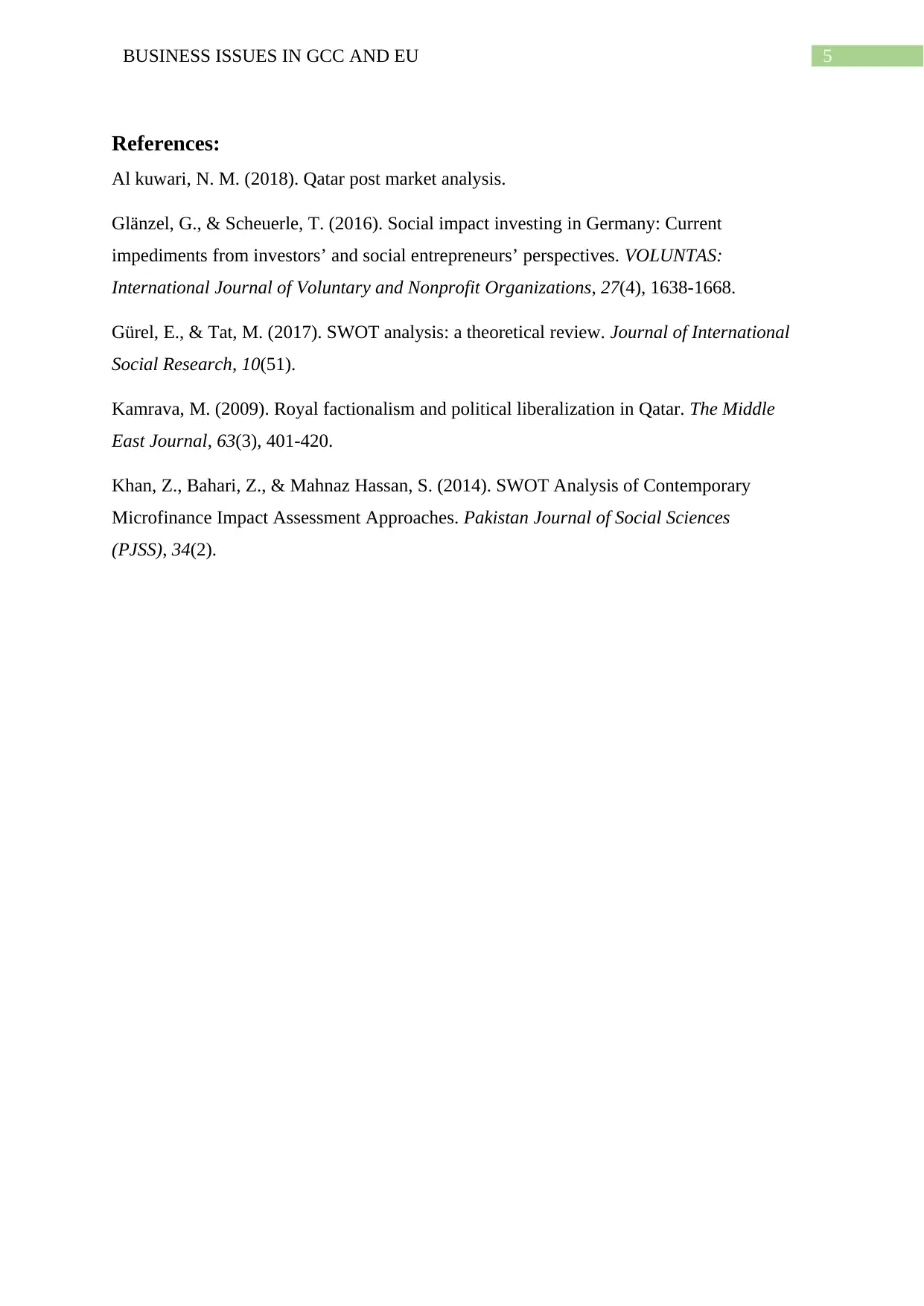
5BUSINESS ISSUES IN GCC AND EU
References:
Al kuwari, N. M. (2018). Qatar post market analysis.
Glänzel, G., & Scheuerle, T. (2016). Social impact investing in Germany: Current
impediments from investors’ and social entrepreneurs’ perspectives. VOLUNTAS:
International Journal of Voluntary and Nonprofit Organizations, 27(4), 1638-1668.
Gürel, E., & Tat, M. (2017). SWOT analysis: a theoretical review. Journal of International
Social Research, 10(51).
Kamrava, M. (2009). Royal factionalism and political liberalization in Qatar. The Middle
East Journal, 63(3), 401-420.
Khan, Z., Bahari, Z., & Mahnaz Hassan, S. (2014). SWOT Analysis of Contemporary
Microfinance Impact Assessment Approaches. Pakistan Journal of Social Sciences
(PJSS), 34(2).
References:
Al kuwari, N. M. (2018). Qatar post market analysis.
Glänzel, G., & Scheuerle, T. (2016). Social impact investing in Germany: Current
impediments from investors’ and social entrepreneurs’ perspectives. VOLUNTAS:
International Journal of Voluntary and Nonprofit Organizations, 27(4), 1638-1668.
Gürel, E., & Tat, M. (2017). SWOT analysis: a theoretical review. Journal of International
Social Research, 10(51).
Kamrava, M. (2009). Royal factionalism and political liberalization in Qatar. The Middle
East Journal, 63(3), 401-420.
Khan, Z., Bahari, Z., & Mahnaz Hassan, S. (2014). SWOT Analysis of Contemporary
Microfinance Impact Assessment Approaches. Pakistan Journal of Social Sciences
(PJSS), 34(2).
1 out of 6
Your All-in-One AI-Powered Toolkit for Academic Success.
+13062052269
info@desklib.com
Available 24*7 on WhatsApp / Email
![[object Object]](/_next/static/media/star-bottom.7253800d.svg)
Unlock your academic potential
© 2024 | Zucol Services PVT LTD | All rights reserved.





